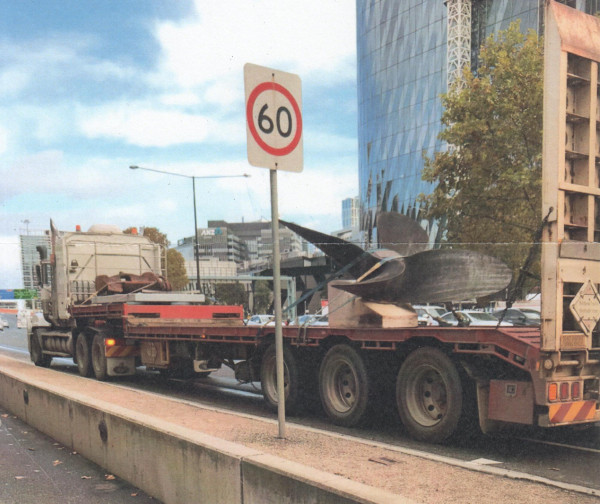“I have only time for eternity.” Thomas Merton, The Sign of Jonas (San Diego: Harcourt, 1953), 120.
A goodly candidate as a motto.
Monthly Archives: June 2020

Propelled into history
In an earlier page I mentioned the VGSS Lady Loch; my great-grandfather John Slater Anderson was among those who designed and built it.
A spare propeller of about three tons weight was cast for the Lady Loch at the time of her construction in 1886. Lady Loch was a 487-ton steam vessel built in Melbourne by Campbell, Sloss & McCann in 1886 for colonial Victoria’s Department of Trade & Customs. She was used by Victoria as a lighthouse tender. With federation, care of lighthouses was transferred to the Commonwealth. The Commonwealth bought the vessel and, presumably, the spare propeller. After a chequered history, Lady Loch became a mere hulk and was finally scuttled in Moreton Bay in 1962.
For some years, the propeller was displayed on the street frontage of a government building in Mort Street, Canberra. When the building was demolished and the propeller moved. I wrote to ask of its whereabouts.
Dr Steven Kennedy, PSM, Secretary of the Department of Infrastructure, Transport, Cities and Regional Development, kindly replied that his department and the Australian Maritime Safety Authority had arranged for the propeller to be displayed in the newly established Seafarers Rest Park in Melbourne. The Park is being developed along the Yarra River in the heart of the city. The propeller is seen above on a truck as it arrived in Melbourne. The park is next to the heritage building of the Mission to Seafarers an active Christian ministry caring for merchant sailors who visit our ports.

An Agenda for Joy
My PhD is done, and my degree was conferred yesterday. My thesis, “An Agenda for Joy: Rowan Williams’s Theology of Conflict, Unity, and Solidarity,” is available from Charles Sturt University’s open access portal at https://researchoutput.csu.edu.au/en/publications/an-agenda-for-joy-rowan-williamss-theology-of-conflict-unity-and-.
 My study seeks a theological understanding of disagreement and conflict in church and society through a reading of the work of Rowan Williams. Williams’s theology of church and his understanding of its unity are closely interrelated. The church itself and its unity are God’s gift. Williams argues that conflict and unity are not opposed but are essential parts of the struggle for mutual recognition and solidarity. Thus I propose solidarity as a category through which to understand the oneness of the church and its relationship with society. According to Williams, God creates and sustains a universe of immeasurable difference within itself. Williams employs Gillian Rose’s reading of Hegel to introduce a metaphysical understanding of such difference and our response to it. The communal work of truth-seeking requires unavoidable negotiation, self-dispossession and loss, without which there may be tragic misrecognition of our interests and those of others. I critically examine situations of conflict that exemplify and test Williams’s theology. Looking beyond the church, I then explore Williams’s theologically grounded proposals for solidarity in a pluralist society oriented towards the common good.
My study seeks a theological understanding of disagreement and conflict in church and society through a reading of the work of Rowan Williams. Williams’s theology of church and his understanding of its unity are closely interrelated. The church itself and its unity are God’s gift. Williams argues that conflict and unity are not opposed but are essential parts of the struggle for mutual recognition and solidarity. Thus I propose solidarity as a category through which to understand the oneness of the church and its relationship with society. According to Williams, God creates and sustains a universe of immeasurable difference within itself. Williams employs Gillian Rose’s reading of Hegel to introduce a metaphysical understanding of such difference and our response to it. The communal work of truth-seeking requires unavoidable negotiation, self-dispossession and loss, without which there may be tragic misrecognition of our interests and those of others. I critically examine situations of conflict that exemplify and test Williams’s theology. Looking beyond the church, I then explore Williams’s theologically grounded proposals for solidarity in a pluralist society oriented towards the common good.
I am immensely grateful to those who have helped me achieve this happy outcome. My supervisor, Dr Benjamin Myers, gave unfailing wisdom, enthusiasm and valued friendship. I was helped by Ben’s careful perception of what I have been on about and workable ways to get there. He challenged me with penetrating questions and exposed muddled language and thinking.
My closest teacher and friend is my husband, James Kim, to whom I have dedicated this work. His love, courage, and care made it possible.
Years ago, my undergraduate mentor, Dr Graeme Garrett, told me that the greatest value of a doctoral project in theology would be whatever it did within the depths of my own soul. So it has been. Thus, in his doctoral thesis, Rowan Williams wrote of Vladimir Lossky’s insistence that “to do theology is to engage in an exploration of one’s personal encounter with God in silence.” I also echo Williams’s submission that “anything of value in the pages that follow belongs not to me but to the catholic communion of minds in Christ, mediated to me by my teachers and friends.”1 Without that, I would not have undertaken this study.
. . . . .
- Rowan Williams, “The Theology of Vladimir Nikolaievich Lossky: An Exposition and Critique” (DPhil. thesis, University of Oxford, 1975), xi.